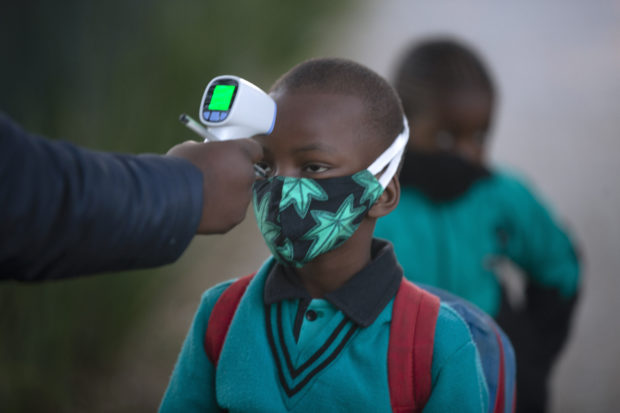
A pupil’s temperature is checked on returning to school in Johannesburg on Tuesday, July 7, 2020, as more learners were permitted to return to class. Schools were shut down in March prior to a total country lockdown in a bid to prevent the spread of coronavirus and are now slowly being re-opened. (AP Photo/Denis Farrell)
JOHANNESBURG — Africa now has more than a half-million confirmed coronavirus cases.
The continent-wide total is over 508,000, according to figures released Wednesday by the Africa Centers for Disease Control and Prevention after South Africa recorded another day of more than 10,000 confirmed cases as a new global hot spot.
The true number of cases among Africa’s 1.3 billion people is unknown as its 54 countries continue to face a serious shortage of testing materials for the virus. “A tremendous problem, a real crisis of access,” the World Health Organization’s (WHO) Africa chief, Matshidiso Moeti, said last week.
So far most testing has been concentrated in capital cities, but infections in many cases have spread beyond them.
Already COVID-19 has killed more people in Africa — 11,955 — than Ebola did in its deadliest outbreak from 2014 to 2016 in West Africa, the WHO said Wednesday.
“With more than a third of countries in Africa doubling their cases over the past month, the threat of COVID-19 overwhelming fragile health systems on the continent is escalating,” Moeti said Wednesday.
“So far the continent has avoided disaster,” she added. If countries can continue to improve testing, tracing and isolating, “we can slow down the spread of the virus to a manageable level.”
Africa’s health systems are the most poorly funded and thinly staffed in the world, and already more than 2,000 health workers have been infected by the virus, according to the WHO.
This week alone, some anxious health workers in Nigeria, Zimbabwe, Congo, and Sierra Leone have gone on strike or demonstrated for adequate protective gear or better pay.
The African continent has just 2.2 health workers — and 0.3 doctors — per 1,000 people, according to the WHO.
Experts have warned that even if badly needed supplies such as ventilators are provided to African nations, another challenge is having enough trained workers to operate them.
So far, WHO-organized shipments to African countries have included more than 3,000 oxygen concentrators, another key piece of equipment to help with breathing.
Africa reaches the half-million-case milestone as a growing number of its countries decide to reopen their skies to commercial flights, saying their economies are sick, too. Months of closed borders bought time to prepare for the pandemic but hurt the delivery of badly needed humanitarian aid.